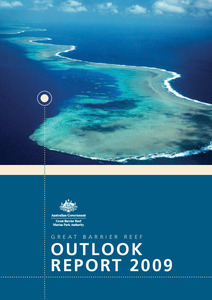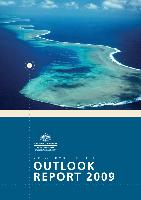Please use this identifier to cite or link to this item:
https://hdl.handle.net/11017/199

Full metadata record
| DC Field | Value | Language |
|---|---|---|
| dc.date.accessioned | 2012-05-25T01:18:11Z | en |
| dc.date.available | 2012-05-25T01:18:11Z | en |
| dc.date.copyright | 2009 | en |
| dc.date.issued | 2009 | en-US |
| dc.identifier.isbn | 9780000000000 | en |
| dc.identifier.uri | https://hdl.handle.net/11017/199 | en |
| dc.description.abstract | The outlook for the Great Barrier Reef ecosystem is at a crossroad, and it is decisions made in the next few years that are likely to determine its long-term future. Unavoidably, future predictions of climate change dominate most aspects of the Great Barrier Reef’s outlook over the next few decades. The extent and persistence of the damage to the ecosystem will depend to a large degree on the amount of change in the world’s climate and on the resilience of the Great Barrier Reef ecosystem in the immediate future. This first Outlook Report identifies climate change, continued declining water quality from catchment runoff, loss of coastal habitats from coastal development and remaining impacts from fishing and illegal fishing and poaching as the priority issues reducing the resilience of the Great Barrier Reef. It also highlights gaps in information required for a better understanding of ecosystem resilience. | en |
| dc.language.iso | en | en |
| dc.publisher | Great Barrier Reef Marine Park Authority | en |
| dc.relation.ispartofseries | Outlook Report 2009 | - |
| dc.rights | Copyright Commonwealth of Australia. This work is copyright. Apart from any use as permitted under the Copyright Act 1968, no part may be reproduced by any process without the prior written permission of the Great Barrier Reef Marine Park Authority. | en |
| dc.subject | Great Barrier Reef (Qld.)-Climate | null |
| dc.title | Great Barrier Reef Outlook Report 2009 | en |
| dc.type | Report | en |
| dc.subject.asfa | Climatic changes | en |
| dc.subject.asfa | Ecosystem resilience | en |
| dc.subject.asfa | Commercial fisheries | en |
| dc.subject.asfa | Water quality | en |
| dc.subject.asfa | Biodiversity | en |
| dc.format.pages | 212 | en |
| dc.description.notes | ID: 1241 | en |
| dc.contributor.corpauthor | Great Barrier Reef Marine Park Authority | en |
| dc.bibliographicCitation.stpage | 192 p. | en |
| dc.subject.apais | Communities | en |
| dc.subject.apais | Environmental management | en |
| dc.publisher.place | Townsville | en |
| dc.relation.connectiontogbrmpa | GBRMPA published this item | en |
| dc.subject.category | GBR outlook report | en |
| dc.subject.category | Information Publication Scheme | en |
| dc.subject.category | Ecosystems | en |
| dc.subject.category | Climate change | en |
| dc.subject.category | Reef managers | en |
| dc.subject.theme | Reef Values | en |
| dc.subject.theme | Corporate Governance | en |
| dc.subject.theme | Reef Ecosystems and Species | en |
| dc.subject.theme | Managing Multiple Use | en |
| dc.subject.theme | Effects on the Reef | en |
| dc.subject.location | Reef-wide | en |
| dc.keywords | D1.3 | en |
| dc.keywords | D2 | en |
| dc.keywords | CCAP output | en |
| dc.keywords | CCAP 09/10 | en |
| dc.keywords | D1 | en |
| dc.keywords | B1.2 | en |
| dc.keywords | C2.2 | en |
| dc.keywords | C2 | en |
| dc.keywords | B1 | en |
| dc.keywords | B1.4 | en |
| dc.keywords | B1.3 | en |
| dc.keywords | A1.4 | en |
| dc.keywords | A1 | en |
| dc.keywords | D2.3 | en |
| dc.keywords | Climate change | en |
| dc.keywords | Climate change action plan 1 | en |
| dc.keywords | Extreme weather | en |
| dc.keywords | Targeted science | en |
| dc.keywords | Bêche-de-mer | en |
| dc.keywords | Ecosystem health | en |
| dc.keywords | Resilient GBR ecosystem | en |
| dc.keywords | Fisheries | en |
| dc.keywords | Marine protected area management | en |
| dc.keywords | Water quality | en |
| dc.keywords | Sea cucumber | en |
| dc.keywords | Great Barrier Reef | en |
| dc.keywords | Commercial and non-commercial use | en |
| dc.keywords | Reduced climate footprints | en |
| dc.keywords | Trawling | en |
| dc.keywords | Outlook Report 2009 | en |
| dc.keywords | Marine ecosystems | en |
| dc.keywords | Biodiversity | en |
| dc.keywords | Marine parks and reserves | en |
| dc.keywords | Environmental management | en |
| dc.keywords | Conservation of natural resources | en |
| dc.keywords | Marine resources | en |
| Appears in Collections: | Community | |
Files in This Item:
| File | Description | Size | Format | |
|---|---|---|---|---|
| Great-Barrier-Reef-Outlook-Report-2009.pdf | 20.06 MB | Adobe PDF |  View/Open |
Items in ELibrary are protected by copyright, with all rights reserved, unless otherwise indicated.
